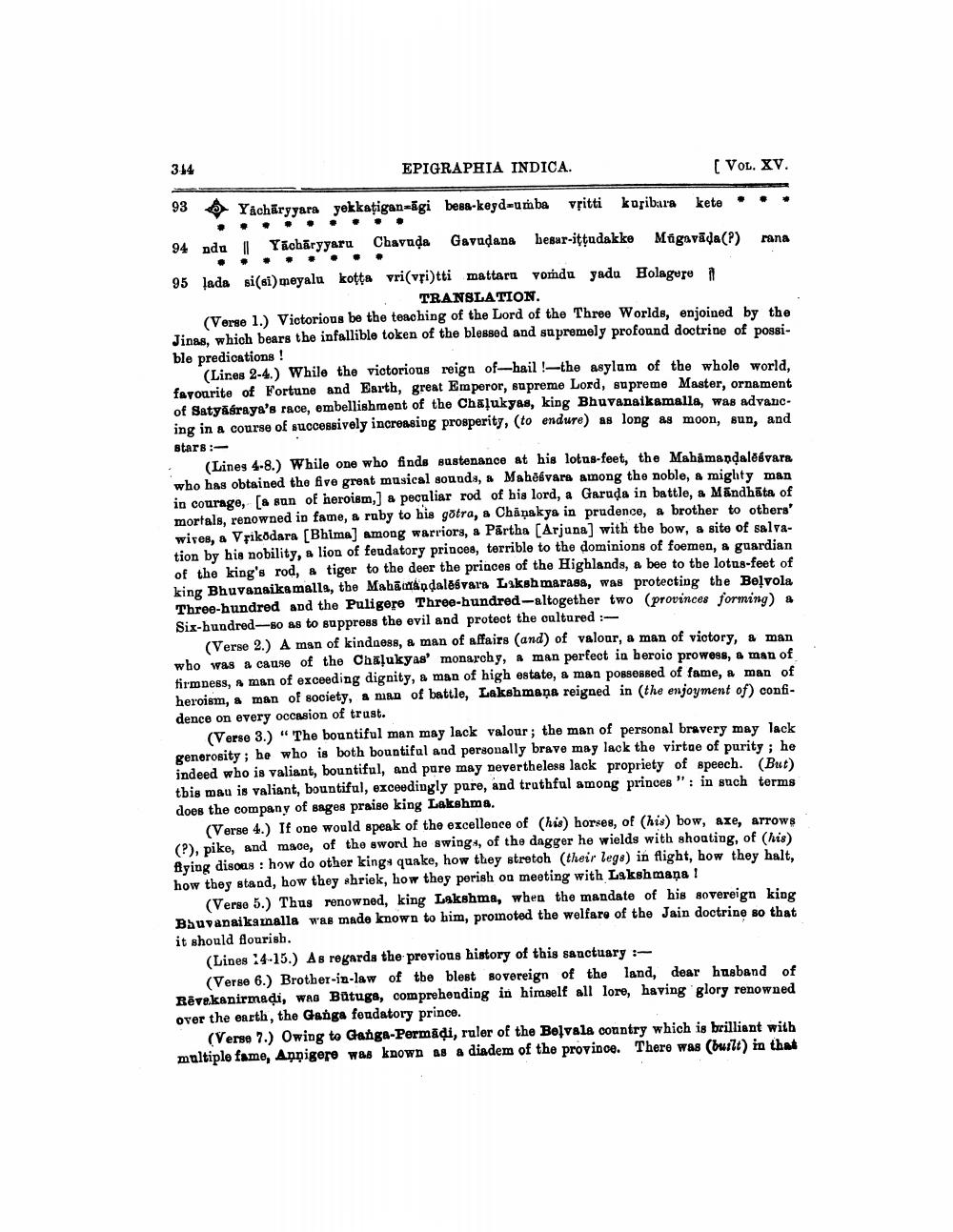________________
314
EPIGRAPHIA INDICA.
[VOL. XV.
Yacharyyara yekkaṭigan-agi besa-keyd-umba vritti kuribara kete 94 ndu | Yacharyyaru Chavada Gavudana besar-iṭṭudakke Mugavada(?)
95 lada si(si) meyalu kotta vri(vri)tti mattaru vomdu yadu Holagere
TRANSLATION.
(Verse 1.) Victorious be the teaching of the Lord of the Three Worlds, enjoined by the Jinas, which bears the infallible token of the blessed and supremely profound doctrine of possible predications!
93
rana
(Lines 2-4.) While the victorious reign of-hail!-the asylum of the whole world, favourite of Fortune and Earth, great Emperor, supreme Lord, supreme Master, ornament of Satyasraya's race, embellishment of the Chalukyas, king Bhuvanaikamalla, was advanc ing in a course of successively increasing prosperity, (to endure) as long as moon, sun, and
stars:
(Lines 4-8.) While one who finds sustenance at his lotus-feet, the Mahamanḍaléévara who has obtained the five great musical sounds, a Mahesvara among the noble, a mighty man in courage, [a sun of heroism,] a peculiar rod of his lord, a Garuda in battle, a Mandhata of mortals, renowned in fame, a ruby to his götra, a Chanakya in prudence, a brother to others' wives, a Vrikōdara [Bhima] among warriors, a Pärtha [Arjuna] with the bow, a site of salvation by his nobility, a lion of feudatory princes, terrible to the dominions of foemen, a guardian of the king's rod, a tiger to the deer the princes of the Highlands, a bee to the lotus-feet of king Bhuvanaika malls, the Mahamandalesvara Lakshmarasa, was protecting the Belvola Three-hundred and the Puligere Three-hundred-altogether two (provinces forming) a Six-hundred-so as to suppress the evil and protect the cultured:
(Verse 2.) A man of kindness, a man of affairs (and) of valour, a man of victory, a man who was a cause of the Chalukyas' monarchy, a man perfect in heroic prowess, a man of firmness, a man of exceeding dignity, a man of high estate, a man possessed of fame, a man of heroism, a man of society, a man of battle, Lakshmana reigned in (the enjoyment of) confidence on every occasion of trust.
(Verse 3.) "The bountiful man may lack valour; the man of personal bravery may lack generosity; he who is both bountiful and personally brave may lack the virtue of purity; he indeed who is valiant, bountiful, and pure may nevertheless lack propriety of speech. (But) this mau is valiant, bountiful, exceedingly pure, and truthful among princes": in such terms does the company of sages praise king Lakshma.
(Verse 4.) If one would speak of the excellence of (his) horses, of (his) bow, axe, arrows (?), pike, and mace, of the sword he swings, of the dagger he wields with shouting, of (his) flying disons: how do other kings quake, how they stretch (their legs) in flight, how they halt, how they stand, how they shriek, how they perish on meeting with Lakshmana!
(Verse 5.) Thus renowned, king Lakshma, when the mandate of his sovereign king Bauvanaikamalla was made known to him, promoted the welfare of the Jain doctrine so that it should flourish.
(Lines 14-15.) As regards the previous history of this sanctuary :
(Verse 6.) Brother-in-law of the blest sovereign of the land, dear husband of Revakanirmaḍi, was Bütugs, comprehending in himself all lore, having glory renowned over the earth, the Ganga feudatory prince.
(Verse 7.) Owing to Ganga-Permadi, ruler of the Belvala country which is brilliant with multiple fame, Appigere was known as a diadem of the province. There was (built) in that




